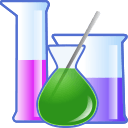Bases
 |
Subject classification: this is a chemistry resource . |
Bases are substances capable of reacting with acids to form salts and water.
 |
Completion status: this resource is a stub, which means that pretty much nothing has been done yet. |
Theoretical bases
By Bronsted-Lowry theory, bases are species (of chemicals) that accept H+ ions in aqueous solutions.
By Lewis theory, bases are species that donate electron pairs to other species. Most likely a Lewis acid (electron pair acceptor) which will accept the pair and form new molecules.
Def. a substance capable of accepting or neutralizing hydrogen ions is called a base.
See also
References
External links
| Chemistry resources |
|---|
| | Lectures | | | | Articles | | | | Courses | | | | Topics |
Acids and bases ·
Advanced Chemistry ·
Analytical Chemistry ·
Astrochemistry ·
Atmospheric chemistry ·
Basic Chemistry ·
Biochemistry ·
Biophysical Chemistry ·
Biological Chemistry ·
Catalysis ·
Chemical engineering ·
Crystal Chemistry ·
Electrochemistry ·
Environmental chemistry ·
Flow chemistry ·
Food chemistry ·
Geochemistry ·
Green chemistry ·
High School Chemistry ·
Historical geology ·
History of chemistry ·
Inorganic Chemistry ·
Marine Chemistry ·
Materials science ·
Medicinal chemistry ·
Mineralogy ·
Mining geology ·
Molecular biology ·
Molecular genetics ·
Nanotechnology ·
Nuclear chemistry ·
Oceanography ·
Organic Chemistry ·
Organometallic chemistry ·
Paleontology ·
Petrochemistry ·
Pharmacology ·
Physical Chemistry ·
Photochemistry ·
Phytochemistry ·
Polymer chemistry ·
Proteomics ·
Quantum chemistry ·
Radiochemistry ·
Soil science ·
Solid-state chemistry ·
Sonochemistry ·
Stratigraphy ·
Supramolecular chemistry ·
Surface chemistry ·
Thermochemistry ·
University Chemistry
| | | Schools |
Agriculture ·
Alternative medicine ·
Business ·
Chemistry ·
Conservation sciences ·
Geology ·
Medicine ·
Pharmacy ·
Physics and Astronomy ·
Veterinary medicine
| | | Activities | | | | Lessons | | | | Original research | | | | Proposal |
| | | History |
| | | Projects | |
|